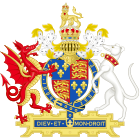| Act of Parliament | |
 | |
| Long title | An Acte concerninge the triall of Treasons commytted out of the Kinges Majesties Domynions.[2] |
|---|---|
| Citation | 35 Hen. 8. c. 2 |
| Territorial extent | England and Wales |
| Dates | |
| Royal assent | 29 March 1544 |
| Other legislation | |
| Repealed by | Criminal Law Act 1967 |
| Relates to | Treasons Act 1534 |
Status: Repealed | |
| Text of statute as originally enacted | |
The Treason Act 1543 (35 Hen. 8. c. 2) was an Act of the Parliament of England passed during the reign of King Henry VIII of England, which stated that acts of treason or misprision of treason that were committed outside the realm of England could be tried within England. Those convicted of high treason would have their estates confiscated by the King and then be hanged, drawn and quartered.
This Act received renewed attention in 1769, following protests against the Townshend Acts in colonial Boston. After determining that the 1543 Treason Act was still in effect, Parliament instructed Governor Francis Bernard of Massachusetts to gather evidence against Bostonians who might have committed acts of treason, so that they could be transported to England for trial. Colonial assemblies in British America passed resolutions against such an action, arguing that it would violate their constitutional right to a trial by jury of their peers.
No one in Massachusetts was arrested under the terms of the Treason Act, but the matter came up again in Rhode Island after the Gaspée Affair in 1772. Once again, officials were unable to obtain reliable evidence of treason.
- ^ The citation of this Act by this short title was authorised by section 5 of, and Schedule 2 to, the Statute Law Revision Act 1948. Due to the repeal of those provisions, it is now authorised by section 19(2) of the Interpretation Act 1978.
- ^ These words are printed against this Act in the second column of Schedule 2 to the Statute Law Revision Act 1948, which is headed "Title".
